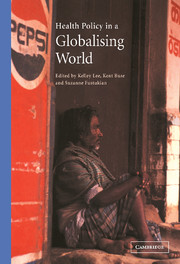Book contents
- Frontmatter
- Contents
- List of figures
- List of tables
- List of boxes
- Notes on contributors
- Foreword
- Preface
- Acknowledgements
- Abbreviations
- Part I
- 1 An introduction to global health policy
- 2 The public health implications of multilateral trade agreements
- 3 Globalisation and multilateral public–private health partnerships: issues for health policy
- 4 Global approaches to private sector provision: where is the evidence?
- 5 Regulation in the context of global health markets
- 6 Global policy networks: the propagation of health care financing reform since the 1980s
- 7 The globalisation of health sector reform policies: is ‘lesson drawing’ part of the process?
- 8 Cost-effectiveness analysis and priority-setting: global approach without local meaning?
- Part II
- Part III
- References
- Index
- References
4 - Global approaches to private sector provision: where is the evidence?
Published online by Cambridge University Press: 22 September 2009
- Frontmatter
- Contents
- List of figures
- List of tables
- List of boxes
- Notes on contributors
- Foreword
- Preface
- Acknowledgements
- Abbreviations
- Part I
- 1 An introduction to global health policy
- 2 The public health implications of multilateral trade agreements
- 3 Globalisation and multilateral public–private health partnerships: issues for health policy
- 4 Global approaches to private sector provision: where is the evidence?
- 5 Regulation in the context of global health markets
- 6 Global policy networks: the propagation of health care financing reform since the 1980s
- 7 The globalisation of health sector reform policies: is ‘lesson drawing’ part of the process?
- 8 Cost-effectiveness analysis and priority-setting: global approach without local meaning?
- Part II
- Part III
- References
- Index
- References
Summary
Introduction
The influence of transnational players on the policies promoted in developing countries is receiving critical attention as analysts explore the impact of globalisation on the role of the state, systems of governance and the quality of global policy prescriptions. Health and social policies, developed in the capital cities of North America and Western Europe and promoted worldwide, may have profound impacts on populations and health systems. This policy-making role, alongside the values and powers which are brought to bear to ensure such policies are adopted, carries with it responsibilities. These include the need to ensure that the policies are focused on tackling the most important problems, that they will benefit the population, especially the poor, and that they stand a good chance of succeeding in the range of settings where they are promoted. Success will partly depend on facilitating local commitment and ownership. Global policy advice, if appropriate at all given the wide variation in contexts, must be under-pinned by adequate evidence. We consider the extent to which evidence has supported policy in relation to one strand of international health policy that has evolved over the last decade – the promotion of private health care provision as part of health sector reforms – and the relevance of global policy prescriptions to national health policies and practice in developing countries.
This chapter reviews the evolution of policy advice to developing countries, from international agencies and powerful donors, regarding how the public sector should relate to for-profit private sector providers (PSPs).
- Type
- Chapter
- Information
- Health Policy in a Globalising World , pp. 63 - 77Publisher: Cambridge University PressPrint publication year: 2002
References
- 1
- Cited by



